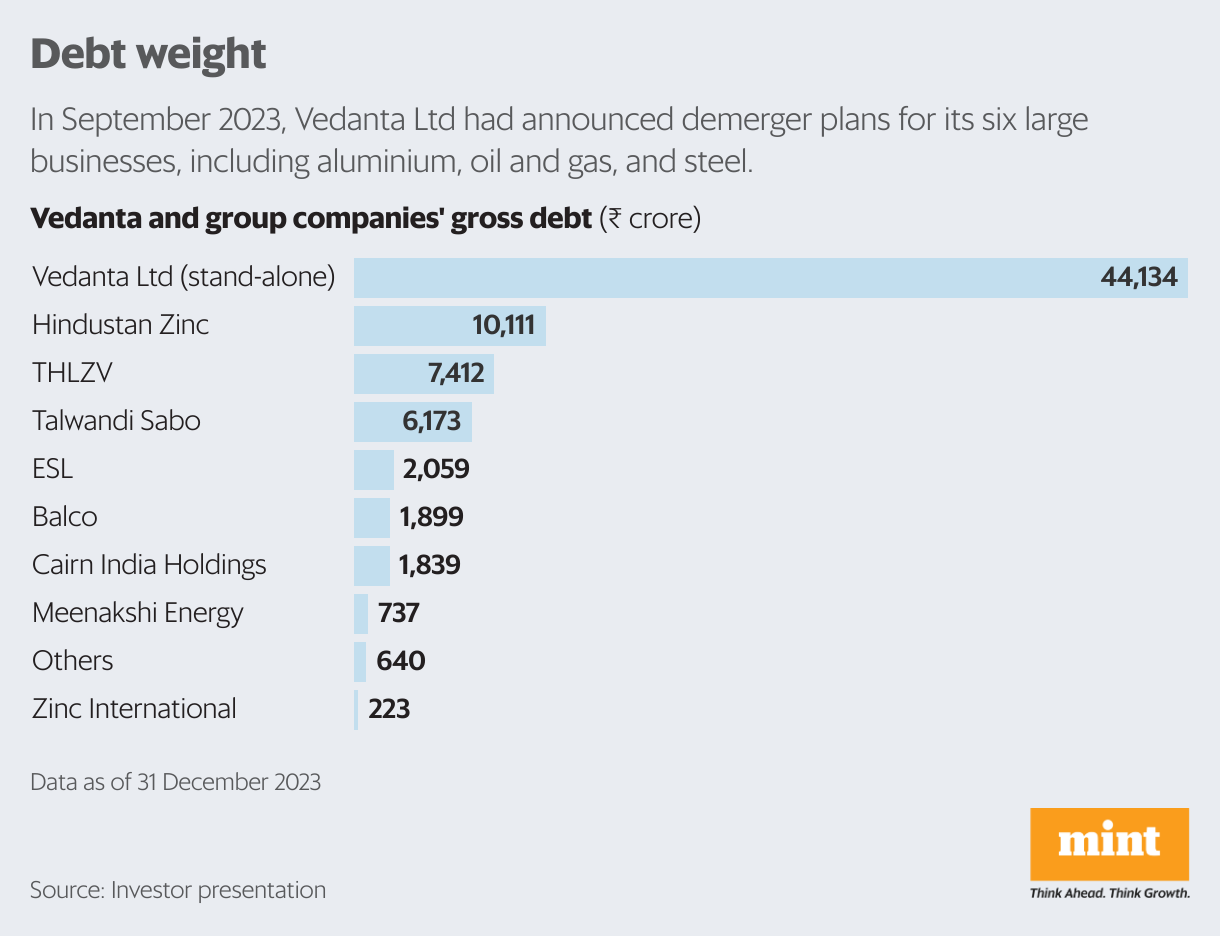The bankers, who are part of the consortium, said the lead lender State Bank of India (SBI) has informed them that its subsidiary SBI Capital Markets (SBI Caps) is looking at the demerger proposal floated six months ago.
“Bankers have appointed SBI Caps to look at issues like division of debt, and they started work on this a few days ago. This was done so that an external expert can closely look at the demerger proposal and see how it will impact lenders,” one of the two bankers said on the condition of anonymity.
The lenders will meet once SBI Caps assesses the plan. In September, billionaire Anil Agarwal-led Vedanta Ltd said it wanted to split the company into six separate listed companies housing businesses such as aluminium, power, and base metals. It is expected to be completed in the coming financial year.
According to the second banker, most of the loans were given to Vedanta Ltd and they have a certain rating, “which would change depending on which new entity our loans reside in after the demerger. We do not know which separate entity will service our loans after the split, and that will be one of the sore points whenever a meeting of the creditors is held.”
According to the second banker, if the resultant debt after the split is in a company housing a business that did not perform well in the past quarters, lenders would be displeased.
Meanwhile, senior executives from Vedanta recently met some bankers to discuss the proposed split and to assuage concerns regarding the proposal, the second banker said.
In a note on 19 January, ratings company Crisil had raised similar doubts. Vedanta currently has a Crisil credit rating of AA-, and is on rating watch with developing implications.
As of 31 December, Vedanta’s standalone gross debt stood at ₹44,134 crore, and after accounting for cash and cash equivalents of ₹1,052 crore, its net debt was at ₹43,082 crore.
Besides State Bank, Vedanta’s other lenders include Bank of Baroda (BoB), Punjab National Bank, Union Bank of India, Axis Bank, ICICI Bank, and IDBI Bank.
Crisil said that clarity on allocation of assets and liabilities across entities under the proposed structure, along with group/parent support philosophy for each entity, was yet to emerge.
This, it said, will be critical for evaluating the credit profiles of the entities, including Vedanta, under the proposed structure, and for the resolution of the rating watch.
In November, Crisil had downgraded Vedanta’s ratings citing an increased possibility of Vedanta’s consolidated financial leverage, or the ratio of net debt to earnings before interest, tax, depreciation and amortization (Ebitda) for FY24 remaining higher than the rating threshold of 2.7 times.
“This is because successful completion of the company’s plans to deleverage the balance-sheet through the inorganic route of asset monetization is expected to fall behind the earlier expected timelines,” the rating agency said in November.
Emails sent to Vedanta, SBI, and SBI Caps remained unanswered till press time.
Others said it would not be smooth sailing for Vedanta. According to analysts at financial research firm CreditSights, the demerger could face major hurdles from Vedanta’s minority shareholders or creditors, potentially derailing the deal.
“While we acknowledge the demerger could improve Vedanta Ltd’s overall equity fund-raising ability and valuations and simplifies price discovery, we are cognizant that cash leakage via dividend upstreaming is still unchanged,” the Fitch group company said in a note on 13 March.
Mint reported in July that local banks had turned cautious on their exposures to Vedanta, worried that chunky dividend payments to ease the parent’s debt burden might stress the local balance sheet. Vedanta Resources holds a 63.71% stake in Vedanta Ltd, which, in turn, owns 64.9% in Hindustan Zinc Ltd. The government owns 29.54% in Hindustan Zinc.
Visit www.cagurujiclasses.com for practical courses











